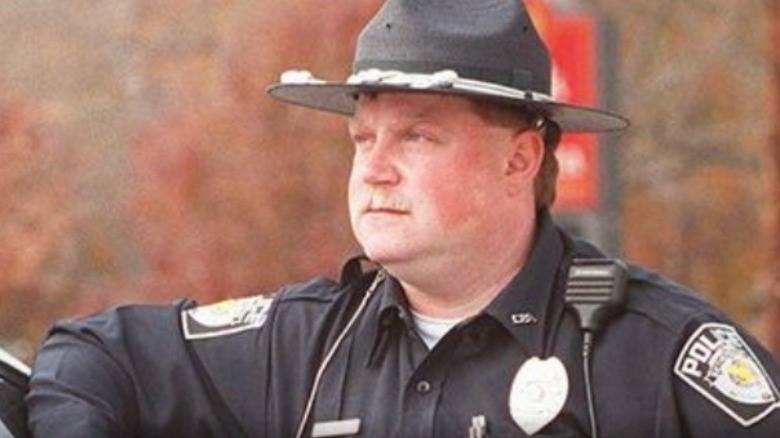Tragic Details About Richard Jewell
Overzealous and unremarkable — those are two words that described Richard Jewell, according to Atlanta Magazine. They are also qualities that may have contributed to the FBI's suspicions that he planted a pipe bomb at the 1996 Olympics at Atlanta's Centennial Olympic Park. Jewell, working the event as a security officer, was the one who notified police of a suspicious green knapsack sitting unattended near a bench in the early morning hours of July 27.
Thanks to Jewell, police confirmed there was indeed a bomb inside the bag and he and members of law enforcement worked quickly to evacuate the area, per Atlanta Magazine. But the bomb was only detected a matter of minutes before it exploded, shrapnel and smoke filling the space. One woman, a spectator named Alice Hawthorne, was killed. A second death came when a cameraman had a heart attack and died shortly after the explosion. Another 111 people were injured.
Still, Jewell was lauded as a hero who likely saved many lives for his quick action in notifying police about the suspicious bag. That is, until a couple of days later when he became the FBI's main suspect in the bombing.
Jewell became a suspect due to FBI profiling
The way a 1996 article called "Presumed Guilty" in Atlanta Magazine tells it, Richard Jewell was described by those who knew him as eager to please to the point of being overzealous. In his roles as a corrections officer, a police officer, and a security officer, he was one of those who would get involved over the slightest thing often causing more trouble than a thing was worth. Jewell was once arrested for impersonating a police officer.
He was demoted and asked to resign from two different posts before landing the security gig at the 1996 Olympics. His did do well, though, after high school prior to his attempts at working in law enforcement when he worked as a supervisor of U.S. Small Business Administration, overseeing the supply and mail rooms. His boss called him Radar because he could find anything, per Atlanta Magazine — including a bomb, apparently.
Jewell was raised by a single mother whom he continued to live with into adulthood, even at the age of 33 when he worked the Olympics. He was called unremarkable in Atlanta Magazine because many who knew him barely remembered him. He seemed to be a loner type, a wanna-be cop, who lived with his mom. According to a case study published by Columbia University, the FBI profiled Jewell and "concurred with Atlanta's assessment that Jewell fit the profile of a person who might create an incident so he could emerge as a hero."
A media frenzy ensued
The media caught wind of the FBI's suspicions and essentially camped out at the apartments where Jewell lived with his mother. According to The New York Times Jewell spent several weeks as a virtual prisoner in his home to avoid the media scrutiny, all while never being charged with a crime. NBC, CBS, ABC, and CNN pitched in to pay a tenant in the apartment complex where Jewell lived $1,000 to use their apartment for what amounted to a stake-out.
Jewell would describe that experience as, "like a piranha on a bleeding cow," The New York Times reported. When he did venture out for necessary trips, he was followed by media vans and FBI vehicles.
Meanwhile, Jewell spent his time watching TV, playing video games, and reading while a team of lawyers worked to prove there was no evidence that Jewell planted the bomb. And there wasn't, which is why he never was charged with a crime in the incident. In fact, it wasn't until October of 1996 that Jewell was finally cleared.
Richard Jewell was cleared and called a hero, again
Ironically, he was cleared in part because the person who actually planted the bomb, Eric Rudolph, called the Atlanta Police Department at 12:58 a.m. the morning it was set to detonate and told them they had 30 minutes before it would go off, per the FBI. According to Atlanta Magazine, eventually, the FBI realized that it would be impossible for Jewell to have made the call at that time and get back two blocks to where the bomb was planted, as it was 12:57 a.m. when law enforcement called in the bomb that Jewell had notified them about. What's more, the caller had no kind of accent, and Jewell had an unmistakable southern drawl.
On October 26 the FBI finally admitted that they had the wrong guy, per The U.S. House of Representatives Subcommittee on Crime, Committee on the Judiciary. A year later in 1997, Rep. Bill McCollum would say in a hearing that looked into the FBI's handling of the investigation, "in case anybody has any lingering doubts today, or watching this hearing on television today, that the Director of the FBI has informed this subcommittee that there is now no question that Mr. Jewell wasn't in any way responsible for the bombing. In my mind, given his prompt action and his assistance to the persons in the park at the time of the bombing, it is quite appropriate to characterize Richard Jewell as a hero."
The accusations changed Jewell's life forever
Even though Jewell was officially cleared of suspicions in the 1996 Olympic bombing, the damage had been done. After nearly three months of national media headlines that insinuated Richard Jewell had planted the pipe bomb, and after several weeks of being harassed and followed by media outlets everywhere he went, he was a changed man.
He'd filed lawsuits against various news outlets and received settlements, but that didn't change the minds of strangers at restaurants and ball games whom he told The New York Times a year later would still stare, or even confront him with accusations. He'd even had trouble getting jobs. And he still held his dream of becoming a cop.
According to The Times, Jewell said in 1997, ”My life's path was forever changed, and it wasn't by my choosing. I'm a lot more cynical than I used to be. I'm not as trusting as I once was. And I don't think I'm as outgoing as I used to be."
Richard Jewell died 11 years after the Olympic bombing
In the decade following the 1996 Olympic bombing, Richard Jewell would realize his dream of working in law enforcement again, according to The Associated Press. He also spoke to college journalism students about his ordeal with the media, which hounded him doggedly though he was never even charged with the bombing.
In 2004, his law enforcement partner was killed while chasing a suspect, per the AP. Then in February 2007, Jewell was diagnosed with diabetes. According to The New York Times, after the diagnoses Jewell had "several" toes amputated, and was in kidney failure. On August 29 he died at the age of 44.
ESPN reported that Jewell's cause of death was a heart attack. Per Georgia's chief medical examiner, Jewell had severe heart disease and the diabetes exacerbated his medical problems. By the time he died, Jewell had married a woman named Dana, according to The New York Times. The day he died, Dana had tried to call him several times but he wasn't answering his phone. When she went home to check on him, she found her husband lying dead on the bedroom floor.





